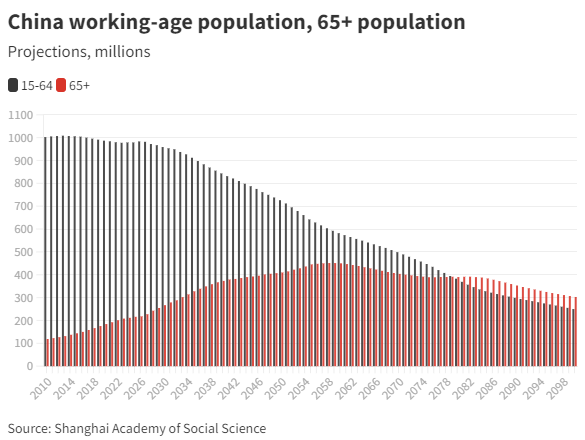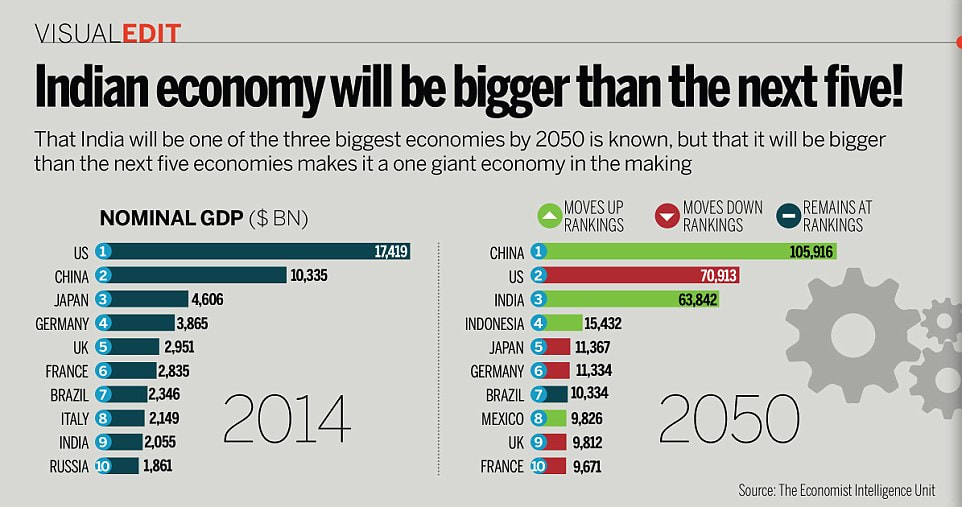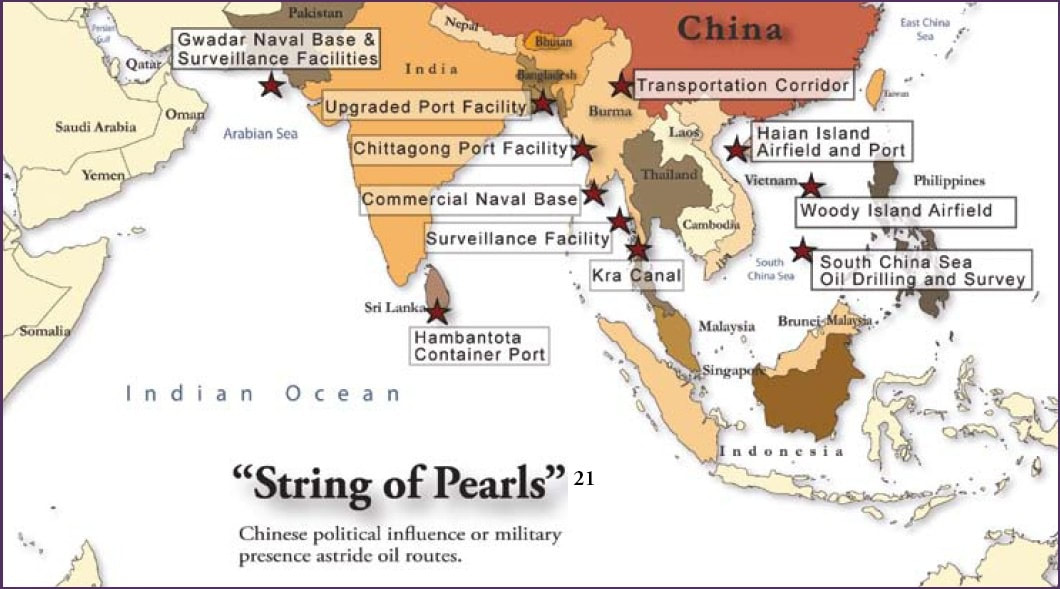I know that Unrivaled has been a long series. But its really important to keep some perspective over the purveyors of doom that dominate politics and media (Note, there are fear-mongers on both sides. Fanning fear and anger is just as profitable for Conservatives as for Progressives).
The next several years (perhaps the rest of this decade) will be very challenging for America. We have an aging demographic and mounting debt. Even worse, the Democrats and the WEF are doing everything they can to erode our beliefs, destroy unity, derail our prosperity and curtail our freedoms. They hope to establish a neo-aristocracy... but I believe they will fail.
| Keep in mind, every other industrial society also has an aging population bubble that places a burden on the shrinking younger, working population. Most major industrial powers will face food and/or energy insecurity over the next 30 years. AND every other industrial nation is burdened by socialism or communism. |
Population and Demographics
Because China and India are so large, we have been conditioned to think of the United States as a small country. In reality, the US is the third largest nation and still growing... while China is now in decline (and has already been surpassed by India). www.worldometers.info/world-population/population-by-country/
Over the next 20 years the Boomer Burden (sorry kids, you have to carry me for awhile) will die off and, by the 2040's, the United States will again have a balanced, youthful, energetic demographic.
Territory
In terms of land area, the United States is only the fourth largest. However, combined with our peaceful neighbors to the north, the US + Canada becomes the largest with almost 20 million kilometers of contiguous land area. www.worldometers.info/geography/largest-countries-in-the-world/
More importantly, the United States controls more surface area than all other nations combined... Our world is 71% ocean and the United States Navy owns the oceans.
No other nation in all of human history has been so unrivaled. Even at its peak, the mighty British Empire had to deal with peers. Only the United States has ever become truly peerless.
The United States has more (and larger) aircraft carriers than ALL other nations combined and more destroyers than the next 15 nations combined... and most of the next top 10 are our (alleged) allies.
China and India are rapidly developing their naval power. But they will not surpass the United States in the next twenty years unless they align against us... but it is far more likely that one of them will align with the United States, Japan, South Korea and Australia.
Defense
Every other major country is surrounded by ancient enemies. The United States isn't. We fight wars on the enemy's turf... not on our own. No part of America has been occupied by an enemy since the War Of 1812 (when the Brits sacked the White House and Andrew Jackson had to kick their asses out of New Orleans). en.wikipedia.org/wiki/Battle_of_New_Orleans
And no American city has been devastated by war since Sherman's March to the Sea.... AND that was self inflicted.
The United States is surrounded by Oceans and cannot be invaded by any country except Mexico.
Food
The United States is absolutely food secure. We are a major food exporter even though we squander millions of bushels of corn making ethanol (to fight bogus climate change).
Food security in China and India is already precarious. About 25% of the Chinese workforce is agrarian. Over the next 30 years the decline in working age Chinese will make food security a serious concern. China MUST devote a significant portion of their GDP to improving productivity in agriculture (Less than 1% of the American workforce produces our surplus of food).
Water
Water is absolutely essential to life. Although Terra is 71% ocean, humans and crops require fresh water... and fresh water only makes up about 1% of the water on our planet. Scarcity of fresh water is a legitimate environmental concern as humans deplete ancient underground aquifers for irrigation.
The Great Lakes alone contain about 21% of the entire world's supply of fresh water. The vast watersheds and river systems of North America are unparalleled.
Economy
The United States continues to have the world's most powerful and innovative economy.
I am amused that all of the 'experts' predict that China will be far-and-away the largest economy by 2050 and that the United States and India will be vying for 2nd place (about half the experts put India in 2nd place and the other half bet on the United States).
The problems with so-called 'experts' is that they project on transient trends and fail to analyze the underlying strengths and weaknesses. As I pointed out earlier, by 2040 the Boomer Bubble in the United States will be subsiding. Furthermore, our bubble will be partially offset by immigration and automation.
Demographically, China is about 15 years behind us. By the mid-2030's China will be starting the greatest demographic implosion in human history... and there is nothing they can do to stop it. I will go out on a limb and predict that by 2040 China will be in a demographic decline while the United States is beginning its next resurgence and while youthful India is rising.
China's population is expected to decline by more than 100 Million by 2050. And, because of aging, their working population will decline by 200-300 Million. (As an aside, that loss is larger than the entire US workforce).
India has a much younger workforce than China. I believe that India could reach GDP parity with the US by 2050.
Energy
The United States is the only major economy that is energy self sufficient.
- Yeah, yeah, Russia is energy independent... but their economy is less than Canada (or Brazil... OMG). I can't honestly consider Russia to be a major economy.
Neither China nor India is energy independent and there is no possibility they will become energy independent over the next 20 years. In spite of the hype/hope for renewables... They will be burning coal for another 50 years. (China is the world's largest coal producer and also the largest coal importer. China already burns more coal than the rest of the world combined).
By contrast, there is no possibility that the United States would not continue to be energy independent over the next 20 years (if the Democrats get out of the way). Combined with Canada, we have a 30 to 40 year horizon to develop alternatives.
Conflict Considerations
Over the next 30 years the rapidly growing economies of China and India will create intense competition for resources. We should recall that throughout the 20th century competition over resources (particularly energy) led to two World Wars and numerous regional conflicts.
War between China and India (or their proxies) is a distinct possibility.
China is currently the world's second greatest military power. Though most of their military is occupied defending their borders, recent alliances with Russia may give them some breathing room.
China is heavily dependent on imported raw materials and energy from throughout southeast Asia (and Australia), oil from the Middle East and from their many investments in Africa. They do not trust the United States Navy to remain unbiased in protecting the Freedom-of-the-Seas (thus far insured by Pax Americana). Consequently, China is rapidly building their Navy.
It is China's intent to dominate the South China Sea (where they have no legitimate territorial claim) and to extend their control through the Indian Ocean and the Arabian Sea. Although the Chinese Navy does not yet have such reach, they have been strategically encircling India with Chinese naval facilities in Burma, Bangladesh, Sri Lanka and Pakistan. India is being threatened.
India has similar resource needs. Their economy is too small to counter the Chinese Naval buildup today, but India will be compelled to confront China in its own territorial waters and the Indian Ocean.
At this point, it is unclear which side will align with the United States.
There are several plausible scenarios. (It is much fun to contemplate the possibilities... YAY).
For the sake of brevity, I will refer to the alliance of Pacific nations fearful of China as the Pacific Rim Alliance (or PacRim). In my humble scenarios, PacRim will be composed of Japan, South Korea, Taiwan, Australia, and, perhaps, some nations threatened by China (Vietnam, Thailand and Indonesia).
Scenario 1: Near term and least likely, is that China backs down... stops threatening Taiwan and Vietnam, halts its naval buildup and places its trust in Pax Americana. China renounces all military expansion and pushes its economy into improving its agricultural productivity and pursuing energy self-sufficiency.
Unfortunately, I see zero evidence that China will even consider this peaceful path because China must deal with India at some point.
Scenario 2: (what is occurring right now) China continues its military buildup. This will compel the nations of PacRim to strengthen their ties with the United States and invest in their own naval and defensive buildups. It also compels India to accelerate it's naval buildup.
China will attempt to avoid confrontation with Japan and Australia.
Scenario 3: (based on a near-term evolution of the second scenario... this is an unlikely scenario because it poses an existential risk to China): China realizes that it cannot out-build the United States and the combined forces of PacRim. China decides on a preemptive attack on Taiwan as a matter of national pride and dignity. Like Hitler's Blitzkrieg attacks in WWII, and Japan's sneak attack on Perl Harbor, China gambles that they can demoralize our alliance into surrender.
- Scenario 3A: Joe Biden is President. The United States flounders and botches the conflict. Our allies are devastated and the United States sinks into decline 50 years ahead of schedule.
- Scenario 3B: Any Republican (who doesn't stumble down stairs or wear a diaper) is President. We rally our allies, and China collapses like the Soviet Union in 1990. Pax Americana is unexpectedly extended for another 50 years.
Scenario 4: China realizes that it cannot out-build the United States and the combined forces of PacRim. And it realizes that eventual competition with India over resources is a greater priority than possession of Taiwan. China seeks a diplomatic accommodation with Taiwan to save face and conflict with PacRim is deferred. China focuses its efforts on developing its own multinational alliance and expanding the 'string of pearls'.
In this scenario, China pivots toward alliances with Islam to 'contain' India and harass the United States. The Islamic Alliance includes Bangladesh, Pakistan, Iran, Malaysia and Indonesia. India is encircled.
Initially, India and China are unwilling to directly confront one another and a 'Cold War' develops. Proxy wars break out in Sri Lanka, Madagascar and East Africa. China might also provoke a renewed war on the Korean peninsula to distract the United States.
Scenario 5: China's demographic implosion is more dire than predicted. The future does not look all that promising by 2040. A declining China aligns with the United States against a rising India... This is unlikely... but stranger things have happened.
Scenario 6: Most likely, in my humble opinion, India becomes an important strategic ally of the United States over the next 20 years.
Many 'experts' discount this possibility because India is part of BRICS today... but as the Chinese Navy expands into the Indian Ocean, they will seek greater alliance with America against the Iranians and Pakistanis to their their west and the insatiable Chinese Empire to their east.
In this scenario, India abandons BRICS and the combined economic and military strength of an Indo-American alliance creates a new global Pax.
Conclusion
I'm optimistic in the long run. In each of the imaginary scenarios (except 3A), the United States remains prosperous and secure.
If the United States can recover from the current mass psychosis... the extreme divisiveness ... and the profound anxiety over the exaggerated bogymen-of-doom, then the inevitable forces of demographics, natural advantages and momentum will prevail.
The future will probably not be peaceful. However, future conflicts, like those of the past 120 years, will NOT take place in North America. They will take place in Asia, Europe and (increasingly) in Africa.
I admit that the future does look scary as world population pushes toward 10 BILLION. However, to survive and prevail we don't have to outrun the bogeymen....








 RSS Feed
RSS Feed